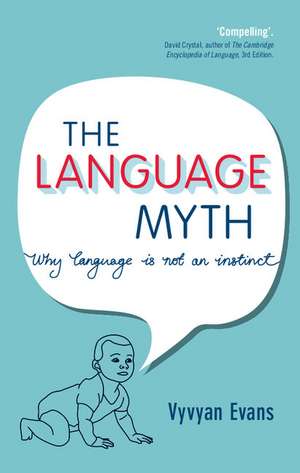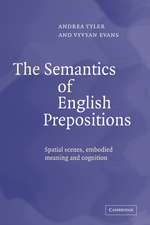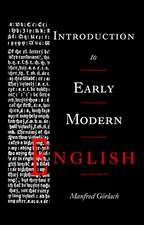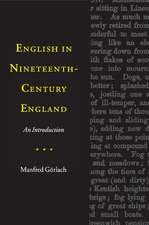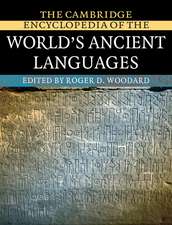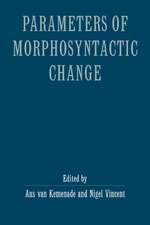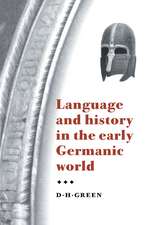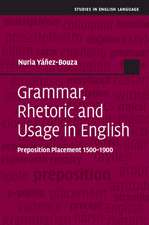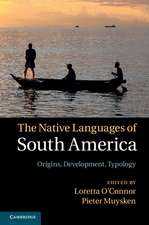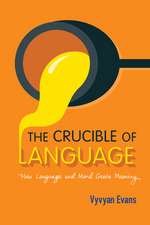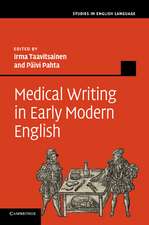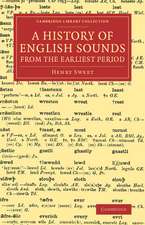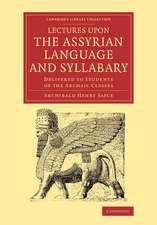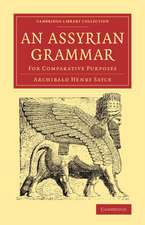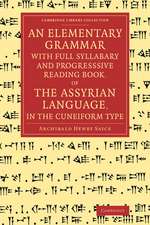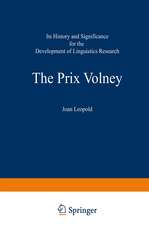The Language Myth: Why Language Is Not an Instinct
Autor Vyvyan Evansen Limba Engleză Hardback – oct 2014
| Toate formatele și edițiile | Preț | Express |
|---|---|---|
| Paperback (1) | 192.18 lei 6-8 săpt. | |
| Cambridge University Press – 21 sep 2014 | 192.18 lei 6-8 săpt. | |
| Hardback (1) | 494.11 lei 6-8 săpt. | |
| Cambridge University Press – oct 2014 | 494.11 lei 6-8 săpt. |
Preț: 494.11 lei
Preț vechi: 555.18 lei
-11% Nou
Puncte Express: 741
Preț estimativ în valută:
94.55€ • 103.02$ • 79.67£
94.55€ • 103.02$ • 79.67£
Carte tipărită la comandă
Livrare economică 23 aprilie-07 mai
Preluare comenzi: 021 569.72.76
Specificații
ISBN-13: 9781107043961
ISBN-10: 1107043964
Pagini: 318
Ilustrații: 11 b/w illus. 11 tables
Dimensiuni: 140 x 216 x 19 mm
Greutate: 0.54 kg
Ediția:New.
Editura: Cambridge University Press
Colecția Cambridge University Press
Locul publicării:New York, United States
ISBN-10: 1107043964
Pagini: 318
Ilustrații: 11 b/w illus. 11 tables
Dimensiuni: 140 x 216 x 19 mm
Greutate: 0.54 kg
Ediția:New.
Editura: Cambridge University Press
Colecția Cambridge University Press
Locul publicării:New York, United States
Cuprins
Acknowledgements; 1. Language and mind rethought; 2. Is human language unrelated to animal communication systems?; 3. Are there language universals?; 4. Is language innate?; 5. Is language a distinct module in the mind?; 6. Is there a universal Mentalese?; 7. Is thought independent of language?; 8. Language and mind regained.
Recenzii
'A much-needed, comprehensive critique of universal grammar. Vyvyan Evans builds a compelling case that will be difficult to refute.' David Crystal, author of The Cambridge Encyclopedia of Language
'Evans' rebuttal of Chomsky's universal grammar from the perspective of cognitive linguistics provides an excellent antidote to popular textbooks where it is assumed that the Chomskyan approach to linguistic theory (in one avatar or another) has somehow been vindicated once and for all.' Michael Fortescue, Professor Emeritus, University of Copenhagen
'The Language Myth builds a compelling case that there is no innate universal grammar. Evans's work is a welcome contribution to our understanding of the origin, nature, and use of human language.' Daniel L. Everett, Dean of Arts and Sciences, Bentley University
'Highly recommended.' Seizi Iwata, Kansai University
'Is the way we think about language on the cusp of a revolution? After reading The Language Myth it certainly looks as if a major shift is in progress, one that will open people's minds to liberating new ways of thinking about language.' New Scientist
'Voluminous … completely persuasive.' Fortean Times
'Although it deals with complex issues, this book will be easily understood by lay readers. Linguists will also benefit from reading this well-researched interdisciplinary book. This book, or chapters from it, can be used as supplementary material in linguistics classes as it presents clear discussions of interesting topics such as the commonalities and differences between human and animal communication systems, linguistic relativity, the colour term controversy, the questions of innateness and modularity and what they would entails, and of course the functioning of the brain and how it is related to communicative behaviour.' Randy J. LaPolla, Studies in Language
'Evans' rebuttal of Chomsky's universal grammar from the perspective of cognitive linguistics provides an excellent antidote to popular textbooks where it is assumed that the Chomskyan approach to linguistic theory (in one avatar or another) has somehow been vindicated once and for all.' Michael Fortescue, Professor Emeritus, University of Copenhagen
'The Language Myth builds a compelling case that there is no innate universal grammar. Evans's work is a welcome contribution to our understanding of the origin, nature, and use of human language.' Daniel L. Everett, Dean of Arts and Sciences, Bentley University
'Highly recommended.' Seizi Iwata, Kansai University
'Is the way we think about language on the cusp of a revolution? After reading The Language Myth it certainly looks as if a major shift is in progress, one that will open people's minds to liberating new ways of thinking about language.' New Scientist
'Voluminous … completely persuasive.' Fortean Times
'Although it deals with complex issues, this book will be easily understood by lay readers. Linguists will also benefit from reading this well-researched interdisciplinary book. This book, or chapters from it, can be used as supplementary material in linguistics classes as it presents clear discussions of interesting topics such as the commonalities and differences between human and animal communication systems, linguistic relativity, the colour term controversy, the questions of innateness and modularity and what they would entails, and of course the functioning of the brain and how it is related to communicative behaviour.' Randy J. LaPolla, Studies in Language
Notă biografică
Vyvyan Evans is a native of Chester, England. He holds a PhD in linguistics from Georgetown University, Washington, D.C., and is a Professor of Linguistics. He has published numerous acclaimed popular science and technical books on language and linguistics. His popular science essays and articles have appeared in numerous venues including 'The Guardian', 'Psychology Today', 'New York Post', 'New Scientist', 'Newsweek' and 'The New Republic'. His award-winning writing focuses, in one way or another, on the nature of language and mind, the impact of technology on language, and the future of communication. His science fiction work explores the status of language and digital communication technology as potential weapons of mass destruction. For further biographical details visit his official website: www.vyvevans.net. For details of his science fiction writing, visit the Songs of the Sage book series website: www.songs-of-the-sage.com.
Descriere
Drawing on cutting-edge research, Evans presents an alternative to the received wisdom, showing how language and the mind really work.
